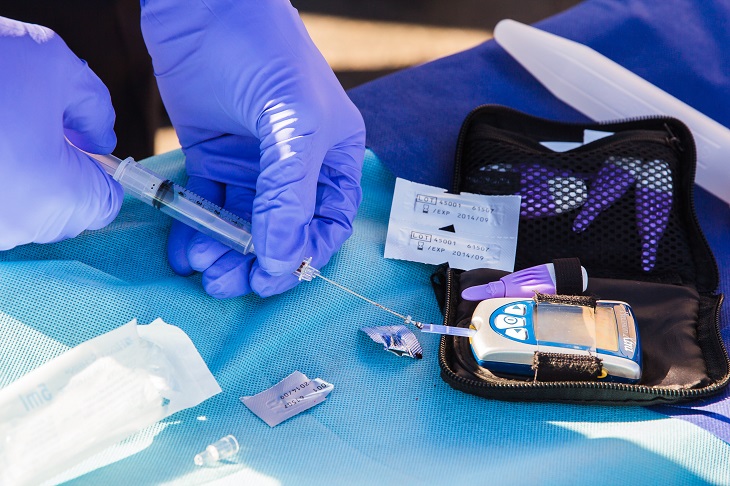THE DAILY DOSE
Peptide Therapy: What Is It & Is It Safe?

Modern medicine has come a long way in treating chronic conditions and sporadic illnesses. When chronic illnesses first began being documented, they were looked at as nothing more than supernatural intervention. But as modernized medicine continued to develop, this old way of looking at death and disease grew less common, and effective treatments were formed.
One effective treatment for a variety of ailments includes insulin, the very first synthetic peptide used in the treatment of diabetes. Since the discovery of insulin and its medical uses, more peptides have been discovered throughout the brain, heart, and other tissues. So what is peptide therapy, exactly? And is peptide therapy safe?

What is peptide therapy?
Peptides are a short-chain of amino acids used for many bodily processes. They are considered to be proteins and are in charge of signaling throughout the body by attaching to receptors on cells, effectively initiating changes and processes while controlling how certain cells react to certain stimuli.
Since peptides are naturally occurring in the thousands, peptide therapy is a form of medicine that has managed to help treat diseases. When using specific peptides, studies have found that the therapeutic medication can target the necessary receptors in an attempt to heal ailments. Some peptides are isolated from natural sources, while others are synthetic.
What is peptide therapy used for?
The first use of peptide therapy helped people with diabetes manage insulin levels, but particular advancements in different forms of treatment has garnered attention for abilities to treat a wide variety of different maladies.
People often use peptide therapy to help combat and manage:
- Osteoporosis
- Rheumatoid arthritis
- HIV
- Certain forms of cancer
- Heart failure
- Multiple sclerosis (MS)
- Hereditary angioedema (severe swelling)
- Chronic pain
- Idiopathic thrombocytopenic purpura (immune disorder causing abnormal blood clotting)
- Hypothyroidism
- Wound healing
- Prevention of bone loss
Other forms of wellness peptide therapy include anti-aging, weight loss, muscle building, insomnia or other sleep disorders, and increased sexual function. As of 2018, there were over 150 peptide-focused medications in development, with 60 already available on the market.
What do peptides do to your body?
The naturally occurring peptides that have a direct effect on how cells work throughout the body are called biopeptides. They are vital components in the structural integrity of tissues and organs, bones and muscle, hormones, antibiotics, and enzymes. The synthetic forms of peptides are also used in courses of treatment, and each specific peptide will do something different for the body. These can be classified into different groups with different medicinal properties.
Groups of peptides include antibiotic peptides, which are used to help ward off infection and act as a first line of defense, whereas cardiovascular peptides contribute to overall heart health. Other groups of peptides include:
- Bacterial
- Brain
- Cancer and anticancer
- Endocrine
- Fungal
- Gastrointestinal
- Invertebrate
- Opiate
- Plant
- Renal
- Respiratory
- Vaccine
- Venom
Although all peptides have a similar structure and function, they are able to assist in the treatment of various diseases because of the sheer amount of them and their classifications. They range from having 2 to 50 amino acids, and where they fall on that spectrum will also differentiate the level and type of treatment they can be used for.
Is peptide therapy effective?
In terms of the very first peptide, insulin injections, there is plenty of evidence to support that peptide therapy does have a positive effect on patients who suffer from diabetes. Insulin is a biopeptide that the body uses to help manage glucose levels in the blood, and is lacked by those who suffer from insulin resistance or diabetes. Thus the insulin injection was born to help combat those ailments, and is still a widely regarded treatment today.
When it comes to other peptide therapies, such as those used in patients with cardiovascular disease, studies have shown that they could be effective in treating heart disease and damage. More research is needed on the subject to confirm the efficacy of peptides for specific heart-related diseases.
Collagen is another peptide that has been used for the treatment of many things, both health-related and in the beauty industry. It has been advertised as an anti-aging marvel and a helpful assistant in maintaining joint health, and even has antioxidant properties that could help reverse oxidative stress.

The future of peptide therapy in medicine
Scientific innovation in the medical space continues to benefit from technological advancements and new discoveries. Peptides, and the continued research around them, have given medical professionals a clearer picture of how they can be used, what their role is in treatment of disease, and where they should continue to go in terms of research.
Early-stage clinical trials for many peptides are ongoing. New peptides are being explored for both assisted reproduction and weight loss, as well as other ailments that could benefit from peptide-induced cell modulation.
Peptide-enriched subscription boxes
Vital RX has launched a series of health subscription boxes that include peptides to help maintain health throughout the year.
The Weight Loss Box includes an AOD-9604 peptide that helps the body release fat from cells and manage appetite, and aids in the prevention of accumulating unhealthy levels of fat throughout the body. It also includes Ibutamoren Mesylate (MK-677), a peptide that encourages healthy levels of bone density and muscle mass, as well as improved sleep quality.
The Detox Box has a super-peptide known as BPC-157 that contributes to overall health. The Immune Box includes CDJ and Thymosin Alpha, known to help improve immune function.
For more information on Vital RX’s subscription boxes and the peptides that go into them, check out all subscription boxes here.
Featured image by Emma Simpson on Unsplash